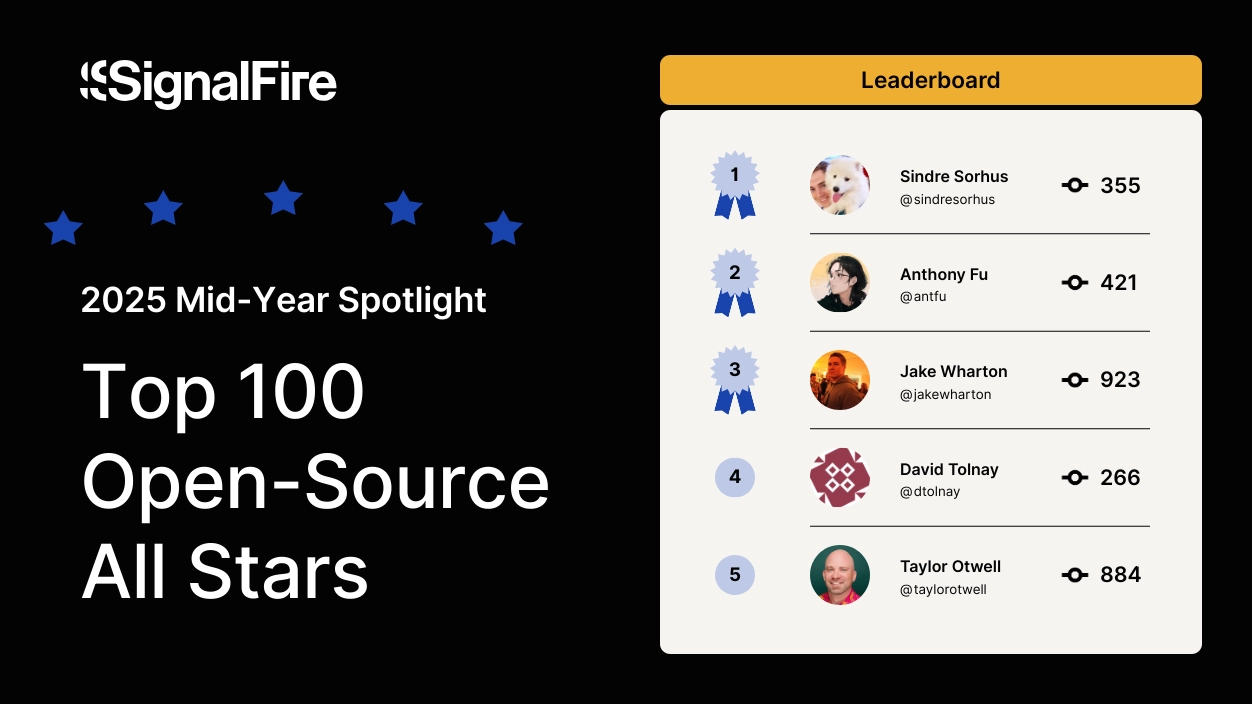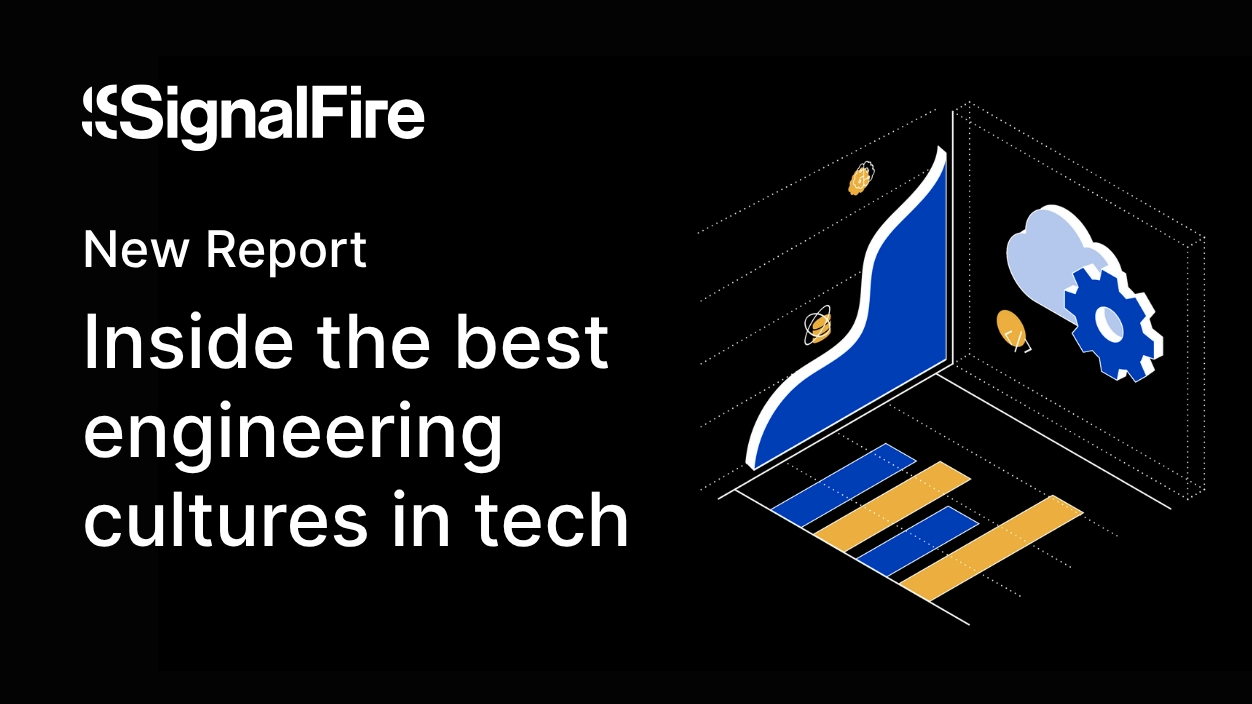
Two of healthcare's most funded startups shut down this year after both raised well over half a billion dollars. So does raising significant capital actually improve a company's chances of success?
SignalFire teamed up with leading healthcare news outlet Fierce Healthcare to identify the 20 most highly funded Healthtech startups and the 20 Healthtech startups with the largest recent funding rounds.
In this report, we break down the biggest trends emerging from the data, from the rise of telehealth pharmacies and value-based care models, to cautionary tales from the flame-outs of Olive and Forward Health.
Ushering in a new era: Total funding champions in 2024
Healthcare is at a turning point, with technology and emerging care models reshaping how we approach everything from drug discovery to patient diagnosis and care. As costs skyrocket—it now takes over $2 billion to bring a single drug to market—innovators are stepping in to challenge the status quo and transform patient outcomes and healthcare delivery in the United States.
Healthcare startups dominating total funding over the past decade tell a story of ambition and scale.
Key findings:
- Surge in Healthtech funding - The top 20 most-funded Healthtech startups raised more than $16.8 billion collectively.
- Healthtech startups with the most total funding include Devoted Health with ~$2.25 billion, Radiology Partners with ~$2.06 billion, Ro with $1 billion, and Lyra Health with $906 million.
- Tech-enabled services and value-based care lead in innovation - Healthtech investments were heavily concentrated on tech-enabled services and value-based care models. Hinge Health (chronic pain and musculoskeletal care), Devoted Health (Medicare Advantage), and Color Health gained traction for their outcomes-focused approaches.
- Telehealth and mental health in the spotlight - Telehealth and mental health platforms like Ro and Lyra were at the forefront of funding trends, addressing rising demand, accessibility issues, and post-pandemic mental health crises.
- Cautionary tales - The recent shutdowns of Forward Health and Olive, despite raising $650 million and $902 million, respectively, serve as stark reminders of the importance of sustainable business models and prudent capital allocation.

1. Devoted Health which offers Medicare Advantage plans designed to improve the health of older Americans with a patient-centered approach. Founded by Todd and Ed Park, they aim to provide accessible benefits with significant savings.
2. Ro a telehealth primary care company that offers diagnosis, prescriptions, medication delivery, and ongoing patient care. Ro’s patient-centric healthcare system offers generic versions of the 500 most common medications, at pricing starting at just $5 per month, from its own pharmacy. Ro offers diagnosis, prescription, and delivery of brand-name treatments for men’s and women’s health, hair loss, smoking cessation, dermatology, weight loss, and more. With their latest round of funding, Ro is aiming to bring its care offline and via in-person at-home care.
3. Radiology Partners a leading radiology practice in the U.S., serving more than 3,400 hospitals and other healthcare facilities with high-quality radiology, technology, and AI solutions. This group leverages innovative technology to provide consistent, high-quality care to patients while delivering enhanced value to hospitals, clinics, imaging centers, and referring physicians.
4. Color Health a population health technology company that enables the delivery of advanced healthcare through clinical genetics. Payors typically manage hundreds of thousands to millions of patients. They’re ultimately responsible for paying the bill so they must understand how healthy their population is and which segments would benefit from proactive health management. Color reviews the entire patient population’s data across all attributes and helps patients find the appropriate care they need. From population genomics programs to high-throughput COVID-19 testing, Color’s platform provides the technology and infrastructure for large-scale health initiatives.
Billion dollar bets: Top 20 Healthtech startups by most recent funding
The last year has seen a surge in capital flow into Healthtech. Our data shows that in the last nine months alone, the 20 Healthtech startups in Chart 2 below raised over $2 billion, despite a tough funding environment.
Key findings:
- Funding was concentrated on innovation in AI and machine learning, mental health, financing, health insurance, specialty care, value-based care, and digital health platforms.
- Healthtech startups with the largest recent rounds (last 6 months) include Abridge with $250 million, PayZen with $200 million (Series B), and Sidecar Health with $165 million (Series D).
- There was a surge in funding for startups like Abridge, Suki, and Regard that provide AI-driven tools for documentation, coding, and workflow automation—critical for addressing physician burnout and revenue cycle inefficiencies.
Outside of AI, our data shows that mental health startups continue to dominate the top 20 recently-funded list, fueled by increased demand, a shortage of therapists, and exacerbated by the mental health crisis during the COVID-19 pandemic. Companies like Grow Therapy ($88 million), Spring Health ($100 million), and Headway ($100 million) exemplify this trend, having secured substantial funding in recent months.

Another notable AI startup automating administrative tasks that nearly made the top 20 list is CodaMetrix, which raised a $40 million Series B this year. It’s the leading AI-powered coding platform that classifies medical codes across radiology, pathology, surgery, gastroenterology, and inpatient visits for dozens of the top health systems in the US. Customers reported a 60% to 70% reduction in manual coding and a 70% reduction in coding denials.
2. PayZen ($200 million - Series B) which offers affordable payment plans for medical bills, enabling patients to manage healthcare expenses without financial strain. The care-now-pay-later company helps any patient get on a zero-interest, zero-fee payment plan so they can receive the care they need immediately without going into debt.
PayZen’s AI analyzes thousands of data points about their financial situation to ensure they’re on a payback schedule they can afford instead of the industry-standard one-size-fits-all plan. The company reported that 87% of patients offered PayZen enrolled, and it increased their payment adherence by 40% within one month.
3. Spring Health ($100 million), Headway ($100 million), and Grow Therapy ($88 million) that offer solutions designed to improve the mental healthcare experience.
For example, Grow Therapy gives therapists:
- software to run their practices on their own terms,
- access to insurance coverage by top payors
- a pipeline of patients through its therapist-matching site.
Since 2020, Grow Therapy has supported over 5 million patient sessions provided by more than 15,000 providers through partnerships with leading payors.
4. Zing Health ($140 million - Series B) a leading Medicare Advantage insurer that was founded in 2019. This physician-founded startup transforms care for underserved seniors with chronic conditions by offering plans with extra benefits and access to top-tier providers, all focused on improving patient outcomes.
5. Thyme Care ($95 million) and Pearl Health ($58 million) are leaders in value-based care for oncology and primary care, showcasing the growing importance of aligning incentives among providers, payers, and patients.
Trends reshaping Healthtech and Pharmatech
Breaking barriers to mental health access for all
The mental health sector stands out as a critical investment theme among these most funded startups. With 1 in 5 adults experiencing mental illness annually and 90% of Americans acknowledging that there's a mental health crisis, investors are responding to both a societal need and a massive market opportunity.
Shortages in therapists and accessible care have fueled new startups to close the gap. Key players like Grow Therapy, Spring Health, Headway, and Lyra represent a new wave of digital-first mental health solutions, capturing significant funding in a market where growth-stage deals are increasingly rare.
Aligning incentives with value-based care
The rise of value-based care models has significantly impacted the Healthtech investment landscape and emerged as a transformative approach, realigning incentives across healthcare's complex ecosystem.
These models, which aim to align incentives between payers, providers, and patients, have attracted funding across various specialties. Companies targeting specific populations—like Devoted Health (Medicare) and Cityblock Health (Medicaid)—have emerged as leaders in this space, demonstrating the potential of value-based care to improve outcomes and reduce costs.
While chronic kidney disease initially garnered significant venture interest, the success of these pioneering models has spurred investment in other specialties, including oncology (Thyme Care), women's health (Maven), and primary care (Pearl Health).
These businesses are capital-intensive, requiring upfront investment in patient care before seeing the returns from shared savings, yet their promise of better outcomes continues to attract funding.
Healthcare AI - Streamlining admin, powering clinical decisions
AI-driven Healthtech solutions addressing critical pain points for providers have secured substantial funding in recent months, focusing on automating administrative tasks first. While AI applications are widespread, two categories have emerged as particularly attractive to investors:
AI Documentation: Automating administrative tasks to solve the critical issue of physician burnout. Physicians currently spend more than 30% of their time on paperwork and notetaking. Key players include Abridge, Suki, and Regard.
AI for Medical Coding: Improving hospital revenue cycles by transforming a historically manual, error-prone process. Tools like Payzen also leverage AI to personalize patient payment plans, improving cash flow for hospitals. Key players include CodaMetrix, SmarterDx and Payzen
The path ahead: Balancing innovation and sustainability
While Healthtech continues to attract record funding, the path to long-term success lies in balancing innovation with operational sustainability. AI-powered tools, value-based care models, and mental health solutions are setting the stage for transformative change. However, the cautionary tales of overfunded failures remind both founders and investors of the importance of focus, discipline, and ultimately, profitability.
SignalFire’s insights into the Healthtech landscape highlight an ecosystem brimming with potential, yet tempered by real-world challenges. By investing in the right startups and technologies, the industry can address pressing issues while paving the way for a more efficient, accessible, and innovative future.
Whether it’s combating mental health crises, streamlining drug discovery, or aligning care incentives, the next wave of Healthtech pioneers is already reshaping how we think about healthcare.
If you're a Healthtech startup ready to take the next step in your fundraising journey, we’d love to hear from you. Reach out to yy@signalfire.com to explore how SignalFire can help fuel your growth.
________________
Research Methodology Note
This analysis prepared by SignalFire's Research and Data Science Team is sourced from our in-house Beacon AI data platform, which tracks over 650 million people and 80 million companies in the tech ecosystem.
This report primarily focuses on venture-backed Healthtech and PharmaTech startups. We excluded pure service and consulting businesses, biotech and diagnostic companies.
Other criteria for companies we included in our research:
- Private (pre-IPO) U.S. companies
- Founded in 2009 or later
- Minimum 10 employees
Our research leverages:
- Proprietary machine learning talent ranking algorithms
- Comprehensive data from 500+ Healthcare and Healthtech startups
- Rigorous multi-dimensional analysis
- Objective, unbiased assessment frameworks
SignalFire is a $2.1 billion AUM early-stage venture capital firm that leads rounds from seed to Series B with a focus on sectors including healthtech and pharmatech, vertical AI, Enterprise SaaS and AI/ML tools. SignalFire has been developing its AI platform, Beacon, for over a decade to help portfolio companies with recruiting and go-to-market strategies.
*Portfolio company founders listed above have not received any compensation for this feedback and may or may not have invested in a SignalFire fund. These founders may or may not serve as Affiliate Advisors, Retained Advisors, or consultants to provide their expertise on a formal or ad hoc basis. They are not employed by SignalFire and do not provide investment advisory services to clients on behalf of SignalFire. Please refer to our disclosures page for additional disclosures.
Related posts



